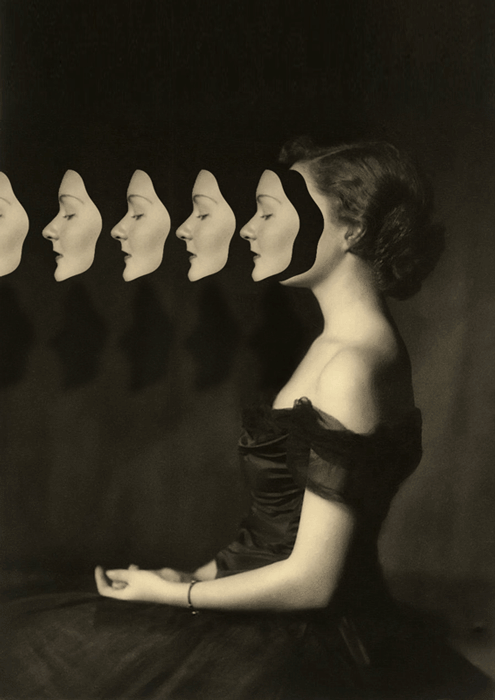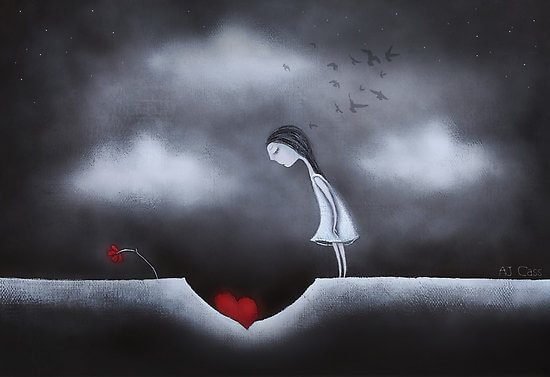Do You Choke Up in the Face of Pressure?

Sometimes, just a look can cause you to lose your concentration and judgment. The pressure of a supervisor, a teacher, a boss, or any powerful figure watching you can immediately cause you to choke up. Suddenly, you start to do everything poorly. You drop things, your mind goes blank, and you don’t know how to respond. Your words and actions simply falter.
Other times, being watched by a powerful figure doesn’t trigger these reactions in you. But instead, an aggressive or intimidating message can lead you to react that way. Like when they ask you a question aggressively, or criticize something you’ve done insistently and almost cruelly. And this prevents you from being able to respond, giving rise to insecurity or even paralysis.
“I was afraid of verbal daggers. I was afraid of the calm before the storm. I was afraid for my own bones. I was afraid of your seduction. I was afraid of your coercion. I was afraid of your rejection. I was afraid of your intimidation. I was afraid of your punishment. I was afraid of your icy silences.”
-Alanis Morissette-
When you think about what happened later, it seems inconceivable that, as an adult, you weren’t capable of reacting coherently. The situation bothers you, fills you with anger and frustration, and you end up blaming yourself for what happened. However, if a similar situation happened again, you would get flustered again and the cycle would continue.
You choke up in the face of internal and external pressure
There are two types of pressure: external and internal. External pressure is the kind we described above, when a person with some sort of power tries to directly influence your words or actions.
External pressure is when someone tries to exercise a strong influence over you with the purpose of intimidating you or inhibiting you. These people don’t generally make their intentions clear; they justify their actions under the pretext of achieving better quality, optimizing time, improving your training, etc.

The point is that for this type of pressure to be successful, it needs to coincide with another type of pressure: internal. The most obvious type of internal pressure is the desire to please the person in power.
This is frequently expressed as anxiety over meeting that person’s expectations. This type of internal pressure can be accompanied by others, like maintaining your image as a competent person, or simply not wanting to look ridiculous in front of others. In other words, not suffering a blow to your ego.
You get flustered precisely because these two types of pressure coincide. It happens in a matter of seconds, and you’re not aware of everything that’s at play in these situations. A demand simply appears, in the form of a look, or a question, or a comment, and you can’t react properly. You just end up looking like a child who’s been scolded, who can neither meet the other person’s expectations, nor have the strength to respond.

It’s possible that, in this kind of situation, maybe you’re just trying to get on their good side. While you drop your pen and your hands shake, you put on a nervous smile and, without knowing why, you end up admitting that they’re right and apologizing for your clumsiness. Or you remain silent and begin a process of self-punishment on the inside.
You choke up because you have a wound that hasn’t healed
Psychological limitations aren’t “manufacturing defects.” They result from an insecurity, or they signal a fear that you have. There’s probably an unresolved event, or many unresolved events, from the past that tell you that you might fail, that you’re going to fail.
One explanation for this bewilderment in the face of pressure is that your life began in environments where contempt, humiliation, and devaluation were prevalent. Your family, your school, or the place where you grew up was probably plagued with criticism, and this has probably come back to haunt you on more than one occasion. Or maybe you went through a traumatic experience that left a mark on your identity: the loss of one of your parents, an illness, a physical limitation, etc.

According to this explanation, you get flustered and choked up when you feel like the dependent and fearful child you once were. Beneath all of these mental blocks are two things: fear and guilt.
Is there an escape? Of course there is. In fact, it can be a fascinating journey, a wonderful challenge in which you can use reality itself to grow. You have to enter that place before anyone else puts you there and make yourself stronger in it. Don’t wait for circumstances to put you in a situation that paralyzes you. Do it yourself in such a way that you have enough control over your environment, so that you can master the situation little by little.
Sometimes, just a look can cause you to lose your concentration and judgment. The pressure of a supervisor, a teacher, a boss, or any powerful figure watching you can immediately cause you to choke up. Suddenly, you start to do everything poorly. You drop things, your mind goes blank, and you don’t know how to respond. Your words and actions simply falter.
Other times, being watched by a powerful figure doesn’t trigger these reactions in you. But instead, an aggressive or intimidating message can lead you to react that way. Like when they ask you a question aggressively, or criticize something you’ve done insistently and almost cruelly. And this prevents you from being able to respond, giving rise to insecurity or even paralysis.
“I was afraid of verbal daggers. I was afraid of the calm before the storm. I was afraid for my own bones. I was afraid of your seduction. I was afraid of your coercion. I was afraid of your rejection. I was afraid of your intimidation. I was afraid of your punishment. I was afraid of your icy silences.”
-Alanis Morissette-
When you think about what happened later, it seems inconceivable that, as an adult, you weren’t capable of reacting coherently. The situation bothers you, fills you with anger and frustration, and you end up blaming yourself for what happened. However, if a similar situation happened again, you would get flustered again and the cycle would continue.
You choke up in the face of internal and external pressure
There are two types of pressure: external and internal. External pressure is the kind we described above, when a person with some sort of power tries to directly influence your words or actions.
External pressure is when someone tries to exercise a strong influence over you with the purpose of intimidating you or inhibiting you. These people don’t generally make their intentions clear; they justify their actions under the pretext of achieving better quality, optimizing time, improving your training, etc.

The point is that for this type of pressure to be successful, it needs to coincide with another type of pressure: internal. The most obvious type of internal pressure is the desire to please the person in power.
This is frequently expressed as anxiety over meeting that person’s expectations. This type of internal pressure can be accompanied by others, like maintaining your image as a competent person, or simply not wanting to look ridiculous in front of others. In other words, not suffering a blow to your ego.
You get flustered precisely because these two types of pressure coincide. It happens in a matter of seconds, and you’re not aware of everything that’s at play in these situations. A demand simply appears, in the form of a look, or a question, or a comment, and you can’t react properly. You just end up looking like a child who’s been scolded, who can neither meet the other person’s expectations, nor have the strength to respond.

It’s possible that, in this kind of situation, maybe you’re just trying to get on their good side. While you drop your pen and your hands shake, you put on a nervous smile and, without knowing why, you end up admitting that they’re right and apologizing for your clumsiness. Or you remain silent and begin a process of self-punishment on the inside.
You choke up because you have a wound that hasn’t healed
Psychological limitations aren’t “manufacturing defects.” They result from an insecurity, or they signal a fear that you have. There’s probably an unresolved event, or many unresolved events, from the past that tell you that you might fail, that you’re going to fail.
One explanation for this bewilderment in the face of pressure is that your life began in environments where contempt, humiliation, and devaluation were prevalent. Your family, your school, or the place where you grew up was probably plagued with criticism, and this has probably come back to haunt you on more than one occasion. Or maybe you went through a traumatic experience that left a mark on your identity: the loss of one of your parents, an illness, a physical limitation, etc.

According to this explanation, you get flustered and choked up when you feel like the dependent and fearful child you once were. Beneath all of these mental blocks are two things: fear and guilt.
Is there an escape? Of course there is. In fact, it can be a fascinating journey, a wonderful challenge in which you can use reality itself to grow. You have to enter that place before anyone else puts you there and make yourself stronger in it. Don’t wait for circumstances to put you in a situation that paralyzes you. Do it yourself in such a way that you have enough control over your environment, so that you can master the situation little by little.
This text is provided for informational purposes only and does not replace consultation with a professional. If in doubt, consult your specialist.







